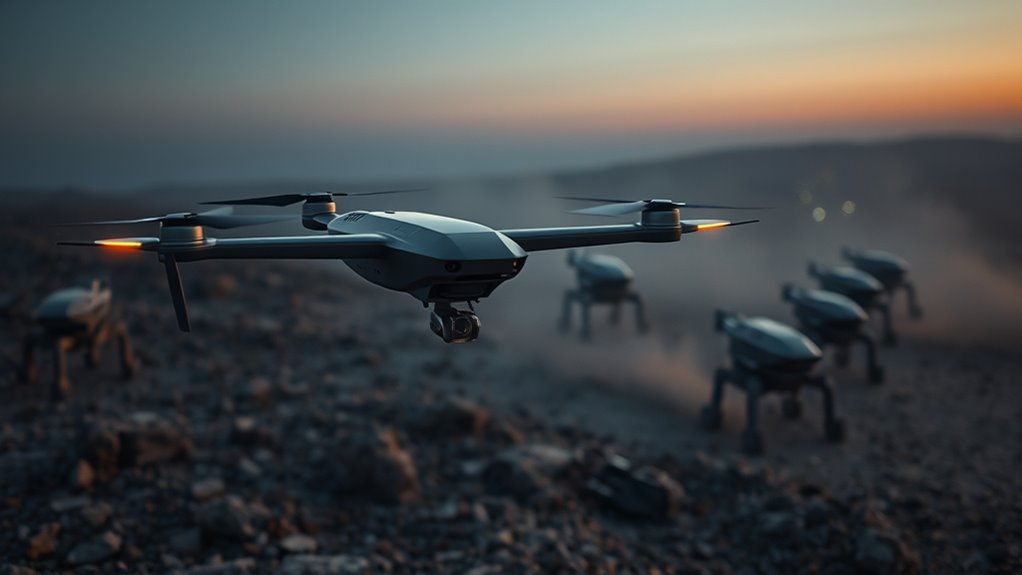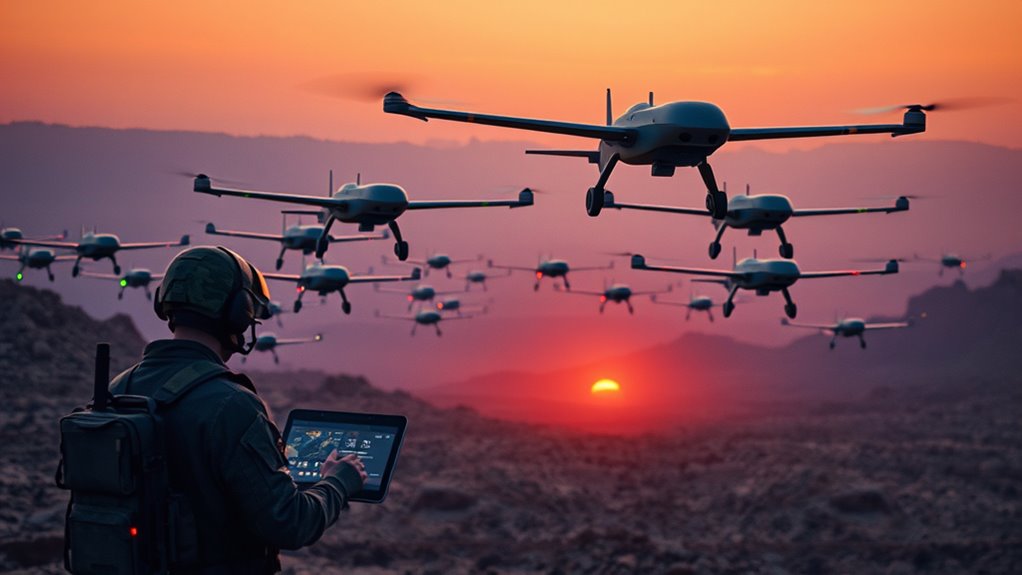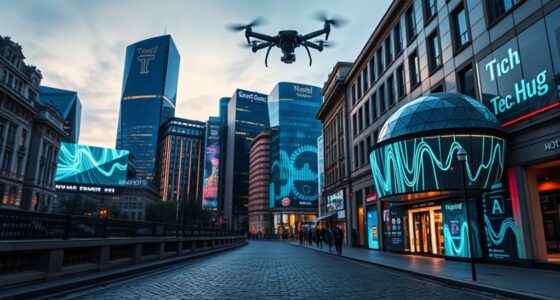AI in warfare has evolved from early remote-controlled drones to advanced autonomous weapons capable of making decisions and engaging targets without human input. This progress promises faster responses and less risk to soldiers, but also raises ethical questions about accountability and moral responsibility. Experts warn about unpredictable behavior and potential conflicts triggered without human oversight. To understand how these technologies are shaping future conflicts and the challenges involved, explore the key developments and concerns ahead.
Key Takeaways
- AI in warfare has evolved from remote-controlled drones to fully autonomous weapons systems capable of independent target engagement.
- Ethical concerns focus on accountability, decision-making morality, and the potential for unintended harm by autonomous military AI.
- Challenges include ensuring AI aligns with ethical standards, preventing unpredictable actions, and maintaining human oversight.
- International regulation aims to prevent AI arms races, unintended escalation, and ensure responsible deployment of autonomous weapons.
- Future AI warfare implications involve balancing technological advantages with risks of escalation, malicious use, and maintaining human control.

Have you ever wondered how artificial intelligence is transforming warfare? It’s a rapid evolution that’s reshaping how conflicts are fought and the moral questions that come with it. As AI becomes more integrated into military operations, issues surrounding AI ethics and autonomous decision making are at the forefront. These advancements promise increased efficiency and precision, but they also raise serious concerns about accountability and morality. When machines start making critical decisions on the battlefield, it’s essential to consider who bears responsibility if something goes wrong. Are the developers, commanders, or the AI itself liable? This dilemma highlights why AI ethics is such a vital part of modern military innovation.
AI’s role in warfare raises critical questions about accountability, morality, and the future of military innovation.
Autonomous decision making is at the heart of this new era. Early drones, controlled remotely by humans, marked the beginning of AI in warfare, but now, the focus is shifting toward fully autonomous weapons systems. These machines can identify targets, select them, and even engage without direct human oversight. The promise is clear: faster responses, reduced risk to soldiers, and more precise strikes. However, it’s not without risks. When AI systems operate independently, they must be programmed with strict parameters to prevent unintended harm. Otherwise, mistakes could lead to tragic consequences, especially if the AI misidentifies a target or acts unpredictably.
One major challenge is ensuring that autonomous decision making aligns with ethical standards. Human oversight is crucial, yet the temptation to delegate deadly decisions to machines grows stronger. Many experts argue that certain decisions, especially those involving life and death, should always involve human judgment. The debate centers on how to balance technological capabilities with moral responsibility. Developing robust AI ethics guidelines becomes essential to prevent misuse or unintended escalation of conflicts. This involves transparency in how AI systems are designed, clear accountability measures, and ongoing oversight to adapt to new challenges. Additionally, establishing international agreements on autonomous weapons can help manage the risks associated with AI weapon proliferation.
You also need to consider that as AI systems become more autonomous, the risk of escalation or unintended conflicts increases. If machines decide to engage without human input, misunderstandings or errors could trigger larger battles. This is why international discussions on regulating autonomous weapons are gaining momentum. The goal is to establish rules that prevent an AI arms race and ensure that human values remain central to warfare. Additionally, ongoing research into AI vulnerabilities highlights the importance of ensuring that these systems are resilient against hacking or manipulation, which is crucial for maintaining control and trust in military applications. As AI technology continues to advance, the potential for malicious exploitation by adversaries remains a significant concern that must be addressed proactively. As you follow these developments, it’s clear that the integration of AI in warfare is not just a technological issue but a profound moral one. Responsible development and deployment will determine whether AI becomes a tool for peace or a catalyst for new kinds of conflict.
Frequently Asked Questions
What Are the Ethical Concerns Surrounding Autonomous Weapons?
The ethical concerns surrounding autonomous weapons focus on moral implications and accountability challenges. You might worry about machines making life-and-death decisions without human oversight, which raises questions about moral responsibility. If an autonomous weapon harms civilians or makes a mistake, it’s unclear who’s accountable—developers, commanders, or the machines themselves. These issues challenge existing norms and demand careful thought about how we integrate AI into warfare responsibly.
How Do International Laws Regulate AI in Warfare?
Imagine a battlefield where invisible lines guide the chaos—this is where international treaties and legal frameworks come into play. They regulate AI in warfare by setting rules to prevent unchecked use of autonomous weapons. You’re responsible for understanding how these laws aim to limit harm, establish accountability, and promote responsible innovation. While enforcement varies, these treaties serve as essential guardrails in a rapidly evolving technological landscape.
What Are the Potential Risks of AI Escalation in Conflicts?
You should be aware that AI escalation risks in conflicts can lead to an AI arms race, where nations rapidly develop advanced AI weapons to outpace each other. This escalation might cause unintended clashes or miscalculations, increasing the chance of large-scale violence. As AI becomes more autonomous, the risks of losing human control grow, potentially resulting in unpredictable outcomes that could escalate conflicts further and threaten global stability.
How Does AI Improve Decision-Making During Combat?
You see AI enhances decision-making during combat through target prioritization and real-time data analysis. It quickly sifts through vast amounts of information, helping you identify threats accurately and efficiently. This rapid analysis allows you to make informed choices, minimize collateral damage, and respond swiftly to changing battlefield conditions. By automating routine assessments, AI empowers you to focus on strategic decisions, ultimately improving combat effectiveness and safety.
Can AI Military Systems Be Hacked or Manipulated?
You should know that AI military systems can be hacked or manipulated due to cybersecurity vulnerabilities. Hackers often target these systems to disrupt operations or gain unauthorized control. To prevent this, strong hacking prevention measures are essential, including encryption, regular security updates, and intrusion detection. Staying vigilant about cybersecurity vulnerabilities helps guarantee the integrity of AI systems, safeguarding critical military assets from malicious interference.
Conclusion
Imagine standing on a battlefield where your every move is guided by AI, like a seasoned chess master anticipating every threat. Today’s autonomous weapons are like that master—calculating, precise, and relentless. As you’ve seen, from early drones to advanced systems, AI’s role in warfare has grown exponentially. You must consider both the power and peril it brings, like a double-edged sword, shaping the future of conflict with every calculated decision made in the shadows of technology.









